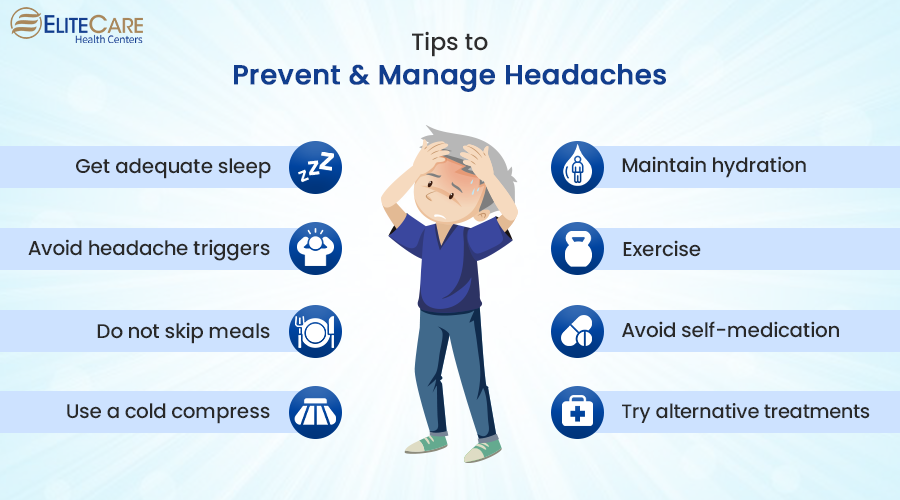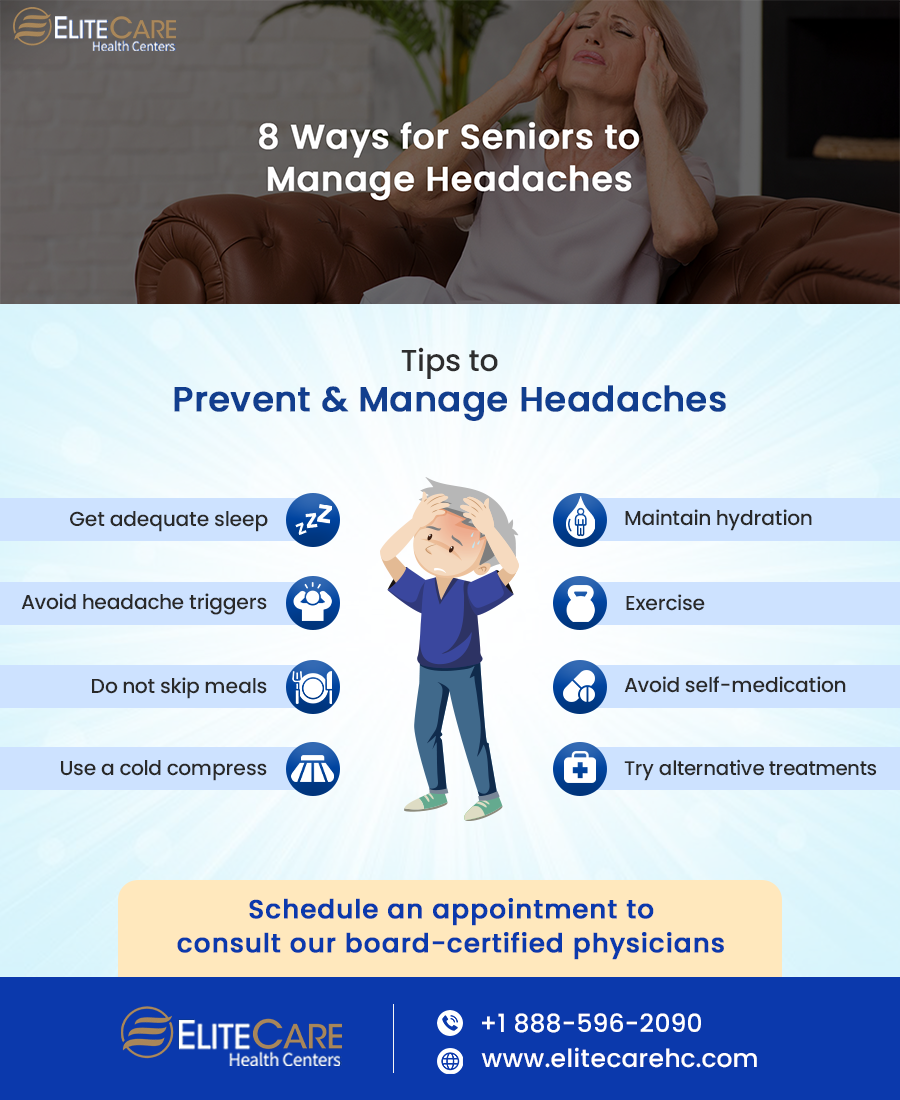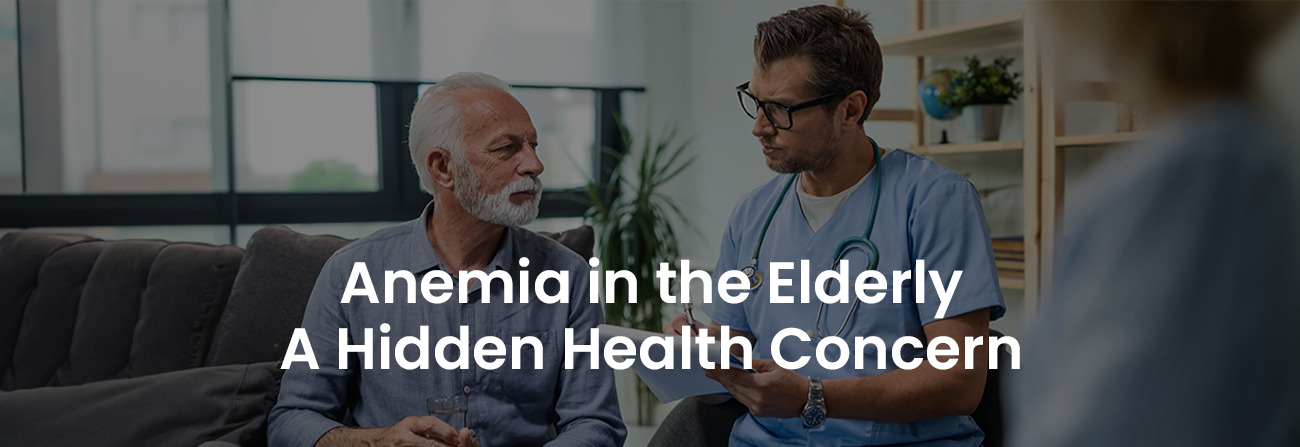
Headaches are a common problem that affects people of all ages, including the elderly. In older adults, headaches are either a result of primary factors like stress and migraines or secondary causes such as overuse of medicines, head trauma caused by accidents, etc. Headaches are painful and can affect the quality of life for seniors. If seniors are experiencing headaches, it is wise to consult primary care services to choose the best course of treatment.
Tips to Manage and Prevent Headaches

Although several medications are available to treat headache symptoms, managing headaches in the elderly is easier with preventive care services. Here are the 8 most effective ways to prevent and manage headaches in seniors.
1. Get adequate sleep
Tiredness and emotional or physical stress are two common factors causing headaches in the elderly. At least six to eight hours of peaceful sleep is required every night to relieve the body from tiredness and stress. If older adults lack adequate sleep, it can result in migraine and tension headaches.
Research from Missouri State University suggests that lack of sleep increases the creation of proteins in the body. These proteins reduce the body’s threshold for experiencing pain and can cause intense migraine headaches, so ensure a regular sleep schedule to prevent headaches effectively.
2. Exercise to ease pain
Exercise helps release chemicals that block pain signals in the brain. It also releases enkephalin, a natural anti-depressant that can reduce stress and aid in getting sleep. Seniors should practice low-impact exercises such as walking or yoga to lower stress levels and get relief from stiffness and pain in muscles. These are the two primary causes of tension headaches.
Besides, yoga and meditation also stimulate the release of endorphins, known as the body’s natural painkillers. Endorphins reduce the intensity of the pain and offer temporary relief from headaches.
3. Identify and avoid headache triggers
According to the researchers, the standard clinical advice to get relief from recurrent headaches is to avoid the triggers. Headache triggers are factors that lead to headaches or increase pain levels. Although these factors vary for everyone, there are some common triggers the elderly should avoid.
Common headache triggers include stress, loud noises, bright lights, strong perfumes, alcohol, processed snacks, and even certain foods such as nuts, bananas, cheese, onions, chocolate, etc.
4. Maintain hydration
In the absence of adequate electrolytes and water in the body, the brain suffers from fluid retention, resulting in headaches. Older adults are more prone to dehydration headaches because they are a common side effect of many prescriptions and over the counter or OTC medications.
To prevent this type of headache, incorporate more fluid-rich foods such as soups, cucumber, watermelon, tomato, iceberg lettuce, cantaloupe. pineapple, oranges. bell peppers etc. into your diet. Also, avoid exposure to extreme heat or heavy exercises and drink enough fluids to balance electrolytes in the body.
5. Never skip meals
Skipping meals is not only problematic for the digestive system but also causes headaches. An empty stomach leads to a significant drop in blood sugar levels. Consequently, the body releases hormones to make up for the depleted glucose levels and narrows the arteries. Therefore, it results in headaches and migraines.
Have breakfast, lunch, and dinner on time, and eat the right portion to keep your stomach full fin addition, older adults should also consume healthy snacks in between meals.
Read more: How Often Do I Need Blood Work
6. Avoid self-medication
The easiest, yet most harmful way to relieve headaches is to self-medicate with painkillers. It can lead to rebound headaches that usually happen after long-term or regular intake of OTC pain relievers like acetaminophen, ibuprofen, etc. Although these medicines offer temporary relief from pain, they can have an adverse reaction in the body, causing nausea, restlessness, irritability, fatigue, etc. Hence, it pushes the patient to take more medications, eventually leading to more painful headaches.
Consult a doctor to identify the root causes of headaches and get effective medical solutions. Wrong medication and overdose of painkillers cause side effects and additional health complications.
7. Use a cold compress
A cold compress is a popular method used to provide temporary relief from headaches. It tightens the blood vessels and reduces the neurotransmission of pain to the brain. Therefore, the brain recognizes the cold more than the pain.
Use a cold, moist cloth on the forehead and temples to reduce the intensity of headache pain. Do not use ice or a cold pack directly on your skin because it can cause irritation and damage skin tissues.
8. Try alternative treatments
Conclusion
Due to the comorbidities, polypharmacy, and physiological changes associated with aging, treating headache disorders in older adults becomes challenging. While prescription and OTC medications are some treatment options to manage headaches, prioritizing preventive measures is crucial. Take the help of a senior care services to follow preventive strategies such as stress management, regular exercise, and adequate sleep are critical to alleviate headache symptoms and provide pain relief in the long run.
Experiencing severe headaches that won’t go away? Contact EliteCare Health Center and schedule an appointment to get a screening now!






